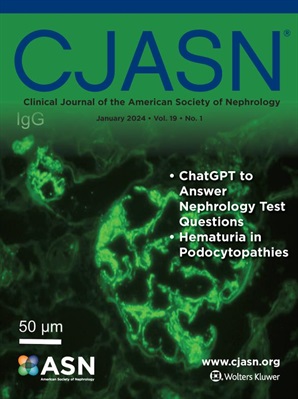肾功能正常者对食用植物肉类替代品的尿液反应:SWAP-MEAT 试点试验
IF 8.5
1区 医学
Q1 UROLOGY & NEPHROLOGY
Clinical Journal of the American Society of Nephrology
Pub Date : 2024-08-26
DOI:10.2215/cjn.0000000000000532
引用次数: 0
摘要
我们假设,与动物肉类相比,食用植物肉类会降低膳食酸负荷,但会增加膳食磷和氮。我们假设,与动物肉类相比,食用植物肉类会减少膳食中的酸负荷,但会增加膳食中的磷和氮。研究方法SWAP-MEAT是一项为期八周的随机交叉试验(NCT03718988),参与者在每个八周的阶段中每天食用大于2份的植物肉或动物肉。我们测量了尿液中的硫酸盐、铵、pH 值、磷、尿素氮、柠檬酸盐和肌酐浓度,以及每个阶段参与者储存样本中的血清肌酐和碳酸氢盐浓度。研究结果我们在一个地点招募了 36 名身体健康的参与者(平均年龄为 50.2±13.8 岁,女性占 67%,白人占 69%)。食用植物肉类饮食与食用动物肉类饮食相比,尿液硫酸盐的平均浓度较低(-6.7 mEq/L; 95% CI -11.0,-2.4)、尿铵(-4.2 毫摩尔/升;95% CI -8.2,-0.1)、尿磷(-9.0 毫克/分升;95% CI -17.5,-0.5)和尿素氮(-124.8 毫克/分升;95% CI -226.9,-22.6)。与食用动物肉类相比,食用植物肉类与较高的平均尿液 pH 值(+0.3 单位;95% CI 0.2,0.5)和平均尿液柠檬酸/肌酐比值(+111.65;95% CI 52.69-170.60)相关。与食用动物肉类饮食相比,参与者食用植物肉类饮食后,平均血清肌酐浓度降低(-0.07 毫克/分升,95% CI -0.10,-0.04),而平均血清碳酸氢盐浓度则没有差异。结论与食用动物肉类相比,食用植物肉类与较低的硫酸盐、铵、磷和尿素氮尿排泄量以及较高的柠檬酸盐尿排泄量有关。我们的研究结果为研究植物肉是否对肾病患者有益提供了依据。版权所有 © 2024 年美国肾脏病学会...本文章由计算机程序翻译,如有差异,请以英文原文为准。
Urinary Response to Consuming Plant-Based Meat Alternatives in Persons with Normal Kidney Function: The SWAP-MEAT Pilot Trial
nefits as eating whole vegetables. We hypothesized that eating plant-meat when compared with animal meat decreases dietary acid load but increases dietary phosphorus and nitrogen. Methods: SWAP-MEAT was a randomized eight-week, crossover trial (NCT03718988) of participants consuming >2 servings/day of either plant-meat or animal meat for each eight-week phase. We measured urine sulfate, ammonium, pH, phosphorus, urea nitrogen, citrate, and creatinine concentrations, and serum creatinine and bicarbonate concentrations from stored participant samples from each phase. Results: At a single site, we enrolled 36 generally healthy participants (mean±SD age 50.2 ± 13.8 years, 67% women, and 69% White). Eating the plant-meat diet vs. eating the animal meat diet was associated with lower mean concentration of urine sulfate (-6.7 mEq/L; 95% CI -11.0, -2.4), urine ammonium (-4.2 mmol/L; 95% CI -8.2, -0.1), urine phosphorus (-9.0 mg/dL; 95% CI -17.5, -0.5), and urine urea nitrogen (-124.8 mg/dL; 95% CI -226.9, -22.6). Eating plant-meat compared with eating animal meat was associated with higher mean urine pH (+0.3 units; 95% CI 0.2, 0.5) and mean urine citrate/creatinine ratio (+111.65; 95% CI 52.69-170.60). After participants consumed a plant-meat diet compared with when they consumed an animal meat diet, mean serum creatinine concentration was lower (-0.07 mg/dL, 95% CI -0.10, -0.04), whereas mean serum bicarbonate concentration was not different. Conclusions: Eating plant-based meat products, compared with eating animal meat, was associated with lower urinary excretion of sulfate, ammonium, phosphorus, and urea nitrogen and higher urinary excretion of citrate. Our findings provide rationale for examining whether plant-based meat will benefit patients with kidney disease. Copyright © 2024 by the American Society of Nephrology...
求助全文
通过发布文献求助,成功后即可免费获取论文全文。
去求助
来源期刊
CiteScore
12.20
自引率
3.10%
发文量
514
审稿时长
3-6 weeks
期刊介绍:
The Clinical Journal of the American Society of Nephrology strives to establish itself as the foremost authority in communicating and influencing advances in clinical nephrology by (1) swiftly and effectively disseminating pivotal developments in clinical and translational research in nephrology, encompassing innovations in research methods and care delivery; (2) providing context for these advances in relation to future research directions and patient care; and (3) becoming a key voice on issues with potential implications for the clinical practice of nephrology, particularly within the United States. Original manuscript topics cover a range of areas, including Acid/Base and Electrolyte Disorders, Acute Kidney Injury and ICU Nephrology, Chronic Kidney Disease, Clinical Nephrology, Cystic Kidney Disease, Diabetes and the Kidney, Genetics, Geriatric and Palliative Nephrology, Glomerular and Tubulointerstitial Diseases, Hypertension, Maintenance Dialysis, Mineral Metabolism, Nephrolithiasis, and Transplantation.

 求助内容:
求助内容: 应助结果提醒方式:
应助结果提醒方式:


